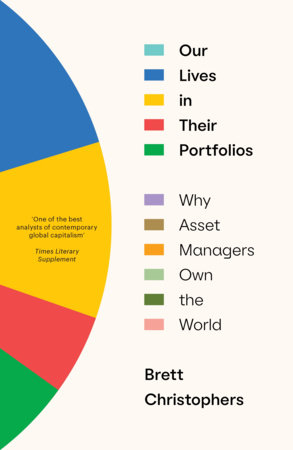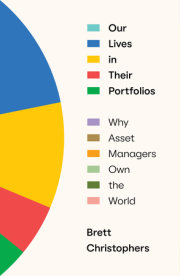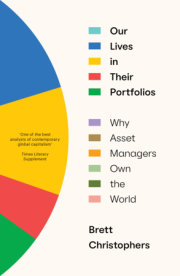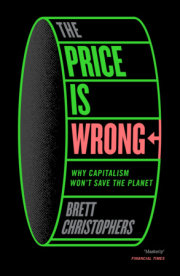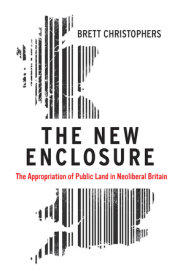"At its best when [Christophers'] passion comes through, stripping away the spin of an industry that likes to portray itself as benefiting teachers, nurses and firefighters but which disproportionately enriches itself."
—Philip Augar, Financial Times
"An illuminating interrogation of asset-manager society and its pathologies."
—John Cassidy, author of How Markets Fail: The Rise and Fall of Free Market Economics
"If big banks were the villains of the 2008 financial crisis, big asset managers may well be at the heart of the next global economic trauma. In this must read book, Brett Christophers outlines how the world's top fund managers and private equity titans have taken over not only our portfolios, but the homes in which we live, the hospitals we go to when we are sick, the food we eat and the water we drink. Our very lives are now financialized - with disturbing consequences that have yet to be understood, or grappled with"
—Rana Foroohar, Global Business Columnist and Associate Editor, Financial Times
"There are few financial topics as deserving of more thorough examination than asset management and its myriad modern manifestations. What insiders often blandly call "non-bank financial institutions" are in reality the new powerhouses of modern capitalism. Brett Christophers ably shows that their dominion has increasingly extended from financial assets to "real" assets - the roads we drive, the water we drink, the homes where we live, and sometimes even the hospitals where we die. As Christophers points out, the broader societal consequences are significant."
—Robin Wigglesworth, Editor, FT Alphaville, and author of Trillions: How a Band of Wall Street Renegades Invented the Index Fund and Changed Finance Forever
"An excellent book that sheds light on the grim reality of modern asset management unfolding at the heart of our society: the homes where we live and the energy infrastructures we depend on. The study of the asset-manager 'society' provides a sobering mapping of the relentless control exerted by asset managers - their portfolios establishing commercialised dependencies across our economy. Christophers successfully uncovers how such investment operations-often under a veil of non-transparent ownership-- put families and their livelihoods at the mercy of rent-seeking corporations. His book is a captivating take on a consequential multitrillion-dollar industry for everyone seeking to understand the configurations of an increasingly unequal and non-transparent economic system."
—Mariana Mazzucato, Professor at University College London and author of The Value of Everything: making and taking in the global economy
"When we shop, park, care for our loved ones, pay rent or our utilities bills, you and I are often little more than tiny trickles of income for companies whose names are not on our bills and that we may not even know. How did this happen and what does it say about where power lies? As ever, Brett Christophers makes a lucid, knowledgeable and impressively unimpressable guide to terrain usually fenced off from the public."
—Aditya Chakrabortty, Senior economics commentator, The Guardian
"Christophers lays out an essential guide to the many ways a poorly understood force in the global economy - asset management - structures our physical world, from housing to food to clean energy. As useful for curious academics as for organizers on the ground, Our Lives in Their Portfolios is a forensic account of an industry so ubiquitous as to go unnoticed. Christophers' engaging, easy to grasp account shines much-needed light on an industry that thrives in darkness, busting open the dangerous myths it tells about itself."
—Kate Aronoff, co-author of A Planet to Win: Why We Need a Green New Deal
"If you are interested in politics, but don't know much about asset managers like Brookfield and Blackstone, you need to read this book. What Brett Christophers reveals in Our Lives in Their Portfolios is the secret fight over who controls our social infrastructure, and whether it will be a small clique of financiers who live in gilded cities, or whether it will be the public. From the rent we pay on our housing to energy grids, sewer systems, and telecom networks, these firms are as important as they are opaque. Christophers shines a light into this secretive arena, and exposes how power works and what the real stakes of our political debates over finance really are."
—Matt Stoller, author of Goliath: The 100-Year War Between Monopoly Power and Democracy
"Christophers takes up the global money trail, highlighting how investors have been quietly buying up critical infrastructure in Europe and beyond."
—Joe Humphreys, Irish Times
"An incisive overview of the outsized returns made on physical assets by a small class of global elites, and the price the rest of society may ultimately pay."
—Spear's
"Worth persevering for the good stuff. Christophers chronicles how Britain has become the focus for Macquarie and the like."
—John Arlidge, The Sunday Times
"An impressive feat...Christophers does what few other economists are able to convincingly undertake in less than three hundred pages. He has written a book on the creeping financialization of our daily lives that an informed, generalist audience can understand, and told it through engaging and relatable case studies."
—Adam Almeida, Jacobin
"Incisively dissects - and criticises - the landscape of this novel stage of capitalism."
—Chris Dorrell, City A.M.
"[One] of the best analysts of contemporary global capitalism."
—Kojo Koram, Times Literary Supplement
"Christophers' neat dissection of the industry ... reveals how, while purporting to work for our retirements, it disproportionately enriches itself."
—Moira O’Neill, Best summer books of 2023, Financial Times
"Necessary reading for anyone wanting to stay abreast of our dysfunctional economic times."
—Will Davies, New Statesman
"Compelling ... details the asset managers' takeover of large swaths of the world economy, notably social infrastructure; the opaque ownership models that conceal them from democratic scrutiny; and their short-term "grab what you can" modus operandi."
—Garreth Dale, Commonweal
"A thorough, critical examination of a key topic with far-reaching consequences."
—Antoine Guironnet, Public Books

